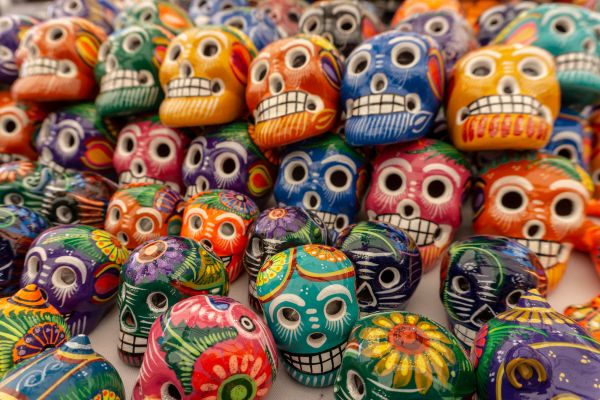This coming week, on November 1st, we’ll celebrate All Saint’s Day, remembering our loved ones, family, friends, and ancestors who have gone before us. It’s a day to honor our grief and those we are missing in this life on Earth. Regardless of how long they may have been gone, it still hits hard on this day and many days. Grief comes in waves. The other day I found myself missing my grandmother who died 14 years ago last March. Most days are fine, but this one day in particular, I found myself wishing I could hear her sweet voice sing the song she sang just for me.
This All-Saint’s Day, I’ve been thinking about the Mexican holiday of Dia De Los Muertos (Day of the Dead). All across Mexico and in many other countries, the day is celebrated with sugar skulls called calaveras, marigolds, candles, pictures of ancestors, and colorful fabrics that are all placed on the home altar called an ofrenda. It’s a day of mourning, but it’s also a day of celebration. As is depicted in the popular movie, Coco, on the Day of the Dead, you tell stories of your ancestors and loved ones that you’ve placed on the altar. Maybe you share that wonderful story of your Great-Grandmother to your own grandkids, so the story stays alive. But for many families, All-Saint’s Day/Day of the Dead is a day to remember and mourn family, friends, and citizens who die each year along the U.S./Mexico border.
According to an article in this month’s edition of Sojourners, “hundreds of migrants die every year along one of the world’s deadliest land borders. The U.S. Customs and Border Protection Agency reports that 8,050 people have died attempting to cross the border between 1998 and 2000. The agency also reported an additional 568 in 2021 and 895 in 2022- the highest deaths recorded in a single year.” Many more than that die from exposure and are left undocumented and unclaimed. Then there are many who die in other countries, enroute to the border. For these reasons, the nearly 2,000 mile stretch along the. U.S./Mexico border has been regarded as a hunted land.
As people of faith, holding a spirituality of justice means that we have the hope in someday witnessing the Kin-dom of God here on earth, when there is health care for all, education that lifts us up, a structure that supports all to be housed and live freely, and where immigrants can find a better life. This All-Saint’s Day, I hope you’ll join me in lighting a candle for the hundreds of people who die each year on one of the world’s deadliest borders, true saint’s who risked their lives for a better life. It shouldn’t have to be this way, and so we pray that someday we overcome it all. “Deep in my heart, I do believe, we shall overcome someday.”

